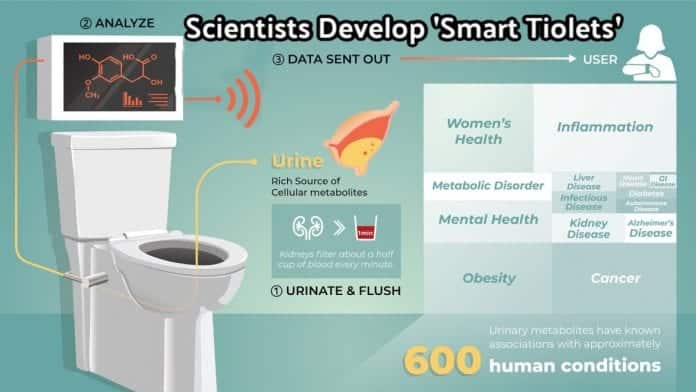
Scientists develop Smart Toilets – University of Wisconsin-Madison Scientists are developing “Smart Toilets” for better health analysis.
The ability to monitor and improve health is being transformed by using smart wearable technologies, but now comes a low-tech commodity, the humble toilet, which could have the potential to outperform all the other wearable technologies.
The two scientists set to develop smart toilets, which can detect kidney diseases, diabetes, urinary tract infections, and other metabolic disorders before the appearance of symptoms.
A team of scientists at the University of Wisconsin-Madison (UW-Madison) is constructing this smart toilet and it is in developmental phases currently.
This technology can collect and compile your health information right from your own home, and scientists claim that this is a non-invasive way of health analysis.
Urine has a virtual liquid history of an individual’s sleep patterns, exercise, nutritional habits, medication use, and other lifestyle choices. Metabolic links to more than 600 human conditions, including some of the major killers such as kidney disease, diabetes, and cancer are contained in the liquid.
The research team at UW-Madison is incorporating a portable mass spectrometer that can pinpoint markers in samples before any symptoms show up in the individuals.
They analyzed
their urinary metabolites using machines known as gas chromatography and mass spectrometers.Over a 10 day period, around 110 samples were analyzed and the team created snapshots of day-to-day health of each individual.
The scientists behind the smart toilet, Joshua Coon and Ian Miller are the two participants in the study and they were able to find that the molecular makeup of their urine showed them how much they exercised, how much they had slept, how much over-the-counter medication they had taken and how much alcohol or coffee they had drunk.
Within 5 years, they hope to have the finished ‘smart toilet’ available but the scientists are aware of the implications it comes with. Doctors can understand your health better through “Smart Toilets”, but with this technology, your personal life could be pried by anyone. As the urine sample is sent to the physician’s office, an online hacker or even an employee will be able to see the individual’s lifestyle and health by intercepting the data.
MIT and European Space Agency (ESA) have teamed up with sanitation specialists last year, to create the ‘FitLoo’, which will gather the data through sensors located inside the bowl and will screen urine for the presence of extra glucose and proteins.
These will detect the presence of other markers that might be an early warning of cancer or diabetes along with the detection of fluctuations in the levels of these substances.
A remote eye can be kept on their patients as the data could be beamed directly to GPs or to your smartphone.
As reported in the Telegraph, FitLoo is based on the technology used by astronauts to monitor their health aboard the International Space Station (ISS).





























